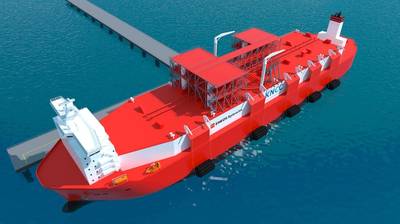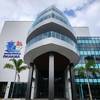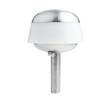Industry Partners Bag ClassNK's Approvals for LCO2 Carrier, FLSU Designs
Knutsen NYK Carbon Carriers (KNCC), a subsidiary of NYK and Knutsen Group, has obtained Approval in Principle (AiP) from ClassNK for the design of liquified CO2 carriers (LCO2-EP carrier) that use the elevated pressure (EP) method to store and transport liquefied CO2 at ambient temperature.
ClassNK has carried out a design review of this ship in accordance with the Rules for the Survey and Construction of Steel Ships, and has issued an AiP after confirming that the ship meets the prescribed requirements.
The LCO2-EP carrier uses LCO2-EP Cargo Tank technology developed by KNCC to transport LCO2 in a stable state. Since there is no need to cool LCO2 to cryogenic temperatures, it is easy to handle and potentially reduces energy and costs during liquefaction.
In addition, NYK, KNCC, and ENEOS Xplora have developed a Floating Liquefied Storage Unit (FLSU) that combines the LCO2-EP Cargo Tank technology with the Isenthalpic Expansion Cooling & Liquefaction Process.
This process has been researched and developed in collaboration among the three companies.
ClassNK has issued an AiP for the FLSU following a review based on the standardized rules.
The FLSU is a pioneering concept that liquefies and temporarily stores CO2 that has been collected and transported as gas in an onshore facility making it ready for further transport by LCO2 carrier.
By utilizing the features of the EP method, which has the potential to reduce the energy required for liquefaction, and adopting the Process, which is expected to be simpler and more compact than conventional cooling methods, it has become possible to install a liquefaction plant on a floating structure.
Carbon Capture, Utilization and Storage (CCUS) is one area that is expected to play a certain role in achieving a carbon-neutral society.
However, issues need to be addressed, such as reducing overall costs and securing land for liquefaction and storage facilities. By utilizing this FLSU, the cost of CO2 liquefaction and the land area required onshore in the CCUS value chain can be reduced, expanding the possibilities for realizing CCUS.
NYK, KNCC, ENEOS Xplora, and ClassNK will continue to contribute to realizing a carbon-neutral society by examining various technologies and assessing their economic and safety aspects towards achieving a CCUS value chain.















